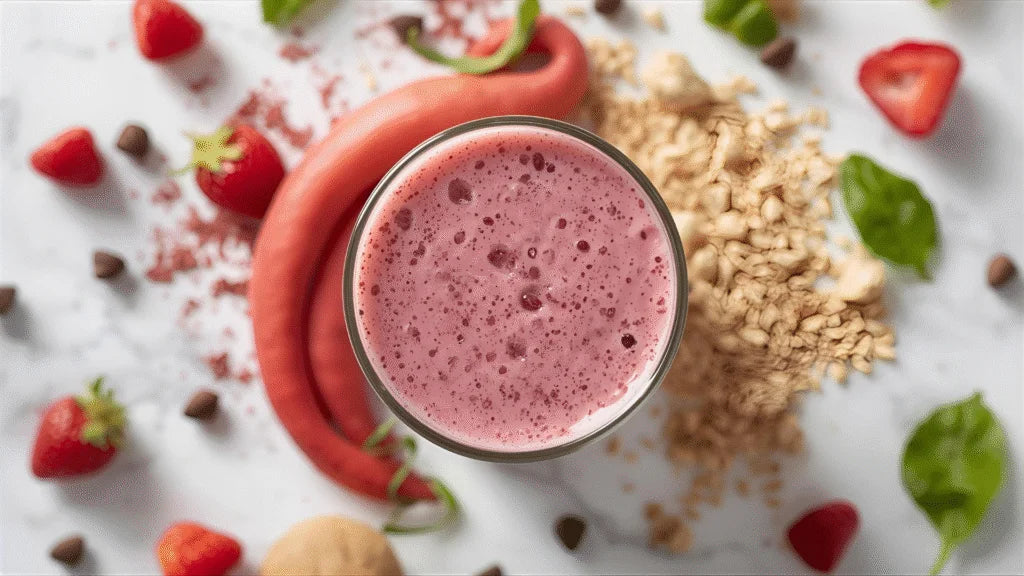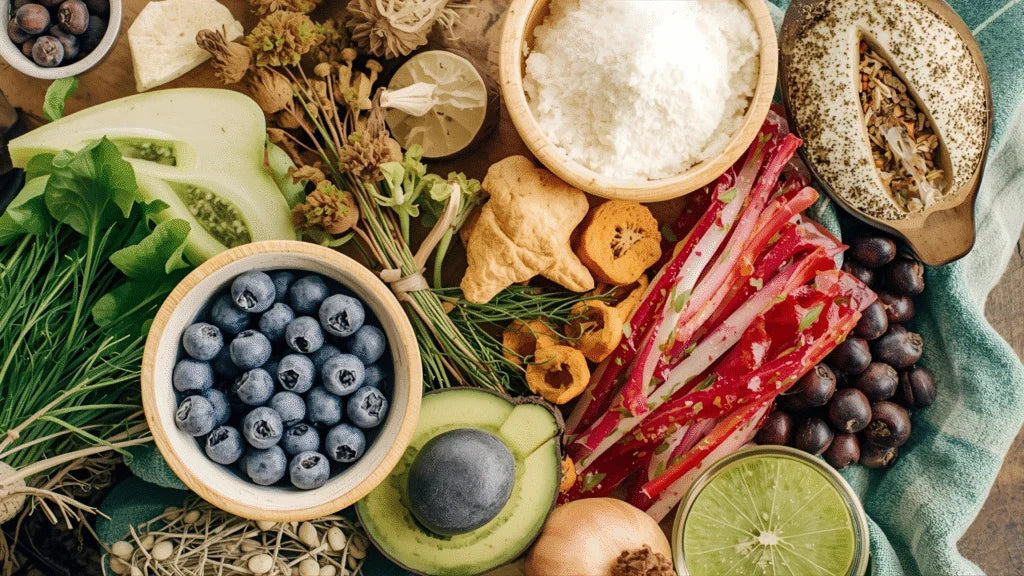Tea & Ayurveda: Ancient Wisdom Meets Your Daily Cup , There's something magical about wrapping your hands around a warm cup of tea. But what if that simple daily ritual could do more than just comfort you? What if it could balance your body, calm your mind, and heal you from the inside out?
That's exactly what Ayurveda—the 5,000-year-old science of life from India—has been saying all along. And honestly? Modern science is finally catching up.
What Makes Ayurvedic Tea Different?
You've probably heard of green tea, chamomile, or peppermint. But Ayurvedic teas? They're in a league of their own. These aren't just tasty beverages—they're carefully crafted formulas designed to balance your body's unique constitution, or what Ayurveda calls your "dosha."
Here's the fascinating part: Ayurveda believes that we're all made up of three fundamental energies—Vata (air and space), Pitta (fire and water), and Kapha (earth and water). When these are balanced, you feel amazing. When they're off? That's when problems start showing up.
The right tea can actually help restore that balance. Pretty cool, right?
The Benefits of Different Teas: Your Ultimate Guide
Let's dive into the world of teas and what each one can do for you. Trust me, once you understand this, you'll never look at your tea cabinet the same way again.
Green Tea: The Metabolism Booster
Green tea isn't just trendy—it's packed with antioxidants called catechins that fight inflammation and protect your cells. Drinking 2-3 cups daily can boost your metabolism, improve brain function, and even help with weight management.
Best for: Mental clarity, weight loss, heart health, and reducing cancer risk
Ayurvedic perspective: Balances Kapha dosha, energizing without being too heating
Black Tea: The Heart Helper
Black tea goes through full oxidation, which gives it that bold flavor and dark color. It's rich in flavonoids that support cardiovascular health and contains enough caffeine to give you a gentle energy lift without the jitters.
Best for: Heart health, gut health, lowering blood sugar, and sustained energy
Ayurvedic perspective: Good for Kapha types but can increase Vata if consumed excessively
Chamomile Tea: The Stress Buster
Ah, chamomile. This is your go-to when life gets overwhelming. It's been used for centuries to calm nerves, improve sleep, and soothe digestive upset. The compound apigenin in chamomile actually binds to receptors in your brain that promote relaxation.
Best for: Sleep problems, anxiety, digestive issues, and menstrual cramps
Ayurvedic perspective: Perfect for calming aggravated Pitta and Vata doshas
Ginger Tea: The Digestive Dynamo
If your stomach could talk, it would probably ask for ginger tea daily. This spicy root is phenomenal for digestion, nausea, inflammation, and boosting immunity. Plus, it warms you from the inside out on cold days.
Best for: Nausea, morning sickness, inflammation, poor digestion, and cold symptoms
Ayurvedic perspective: Kindles Agni (digestive fire), balances all three doshas
Tulsi (Holy Basil) Tea: The Adaptogen All-Star
Called "The Queen of Herbs" in Ayurveda, Tulsi is an adaptogen—meaning it helps your body adapt to stress. It supports your immune system, balances blood sugar, and has powerful anti-inflammatory properties.
Best for: Stress management, immunity, respiratory health, and balancing blood sugar
Ayurvedic perspective: Balances all doshas, especially good for Kapha
Peppermint Tea: The Cooling Comfort
Peppermint isn't just refreshing—it's medicinal. The menthol in peppermint relaxes digestive muscles, eases headaches, and clears congestion. It's like a spa day in a cup.
Best for: IBS symptoms, headaches, sinus congestion, and mental focus
Ayurvedic perspective: Excellent for cooling excess Pitta, can increase Vata in excess
Turmeric Tea (Golden Milk): The Inflammation Fighter
Turmeric lattes aren't just Instagram-worthy—they're incredibly healing. Curcumin, the active compound in turmeric, is one of the most powerful anti-inflammatory substances on Earth. Add black pepper and a bit of healthy fat to boost absorption.
Best for: Joint pain, inflammation, brain health, and immune support
Ayurvedic perspective: Balances all three doshas, especially Kapha and Pitta
Hibiscus Tea: The Blood Pressure Regulator
This tart, ruby-red tea is loaded with antioxidants and has been shown to lower blood pressure as effectively as some medications. Plus, it's naturally caffeine-free and delicious hot or iced.
Best for: High blood pressure, liver health, and weight management
Ayurvedic perspective: Cooling and balancing for Pitta dosha
Ayurvedic Herbs Explained: Nature's Pharmacy
Ayurveda uses hundreds of herbs, each with specific healing properties. Let's explore the powerhouses you should know about.
Ashwagandha: The Stress Slayer
If you're dealing with stress, anxiety, or burnout, ashwagandha might be your new best friend. This adaptogenic root helps regulate cortisol (your stress hormone), improves sleep quality, and even boosts testosterone in men.
How to use: Mix 1/4 to 1/2 teaspoon of powder in warm milk or water before bed. You can also take capsules if you don't like the earthy taste.
Benefits: Reduces stress and anxiety, improves sleep, boosts energy, enhances brain function, increases muscle mass and strength
Triphala: The Gentle Detoxifier
Triphala is a combination of three fruits (Amalaki, Bibhitaki, and Haritaki) that gently cleanses your digestive system without harsh laxative effects. It's like a reset button for your gut.
How to use: Take 1/2 to 1 teaspoon with warm water before bed or first thing in the morning
Benefits: Improves digestion, gentle detoxification, rich in antioxidants, supports healthy weight, improves skin health
Brahmi: The Brain Booster
Known as the "herb of grace," Brahmi has been used for thousands of years to enhance memory, focus, and cognitive function. Students and professionals swear by it during intense mental work.
How to use: Take as a powder, capsule, or brew as tea. Often combined with Ashwagandha for enhanced benefits.
Benefits: Improves memory and learning, reduces anxiety, enhances focus, protects brain cells, supports healthy aging
Neem: The Blood Purifier
Neem is bitter—really bitter—but it's incredibly purifying. It cleanses the blood, supports skin health, and has powerful antibacterial and antiviral properties. Great for acne and skin conditions.
How to use: Take capsules, apply neem oil topically, or use neem leaves in tea (mixed with other herbs to balance the bitterness)
Benefits: Purifies blood, clears skin conditions, supports oral health, boosts immunity, regulates blood sugar
Shatavari: The Women's Wellness Herb
This herb is considered the female counterpart to Ashwagandha. It supports reproductive health, balances hormones, and nourishes the female reproductive system through all life stages.
How to use: Mix powder in warm milk or water, or take as capsules
Benefits: Balances hormones, supports fertility, eases menstrual discomfort, helps with menopause symptoms, boosts immunity
Guduchi (Giloy): The Immunity Powerhouse
Guduchi is called "Amrita" meaning "divine nectar" in Sanskrit. It's one of the most powerful immune-boosting herbs in Ayurveda and helps the body fight infections.
How to use: Take as powder, juice, or capsules. Often combined with tulsi and ginger
Benefits: Strengthens immunity, reduces fever, detoxifies liver, improves digestion, manages diabetes
Amla (Indian Gooseberry): The Vitamin C Champion
Amla contains more Vitamin C than oranges and is one of the richest natural sources available. It's rejuvenating, anti-aging, and supports just about every system in your body.
How to use: Eat fresh (if you can find it), take as powder in water, or use amla juice
Benefits: Boosts immunity, improves hair and skin health, supports heart health, aids digestion, enhances vision
DIY Home Remedies: Your Ayurvedic Medicine Cabinet
Ready to create your own healing remedies? Here are tried-and-true recipes passed down through generations.
Frequently Asked Questions About Tea & Ayurveda
What is the best time to drink Ayurvedic tea?
It depends on the tea! Energizing teas like ginger or tulsi are best in the morning. Calming teas like chamomile or ashwagandha work better in the evening. Digestive teas like CCF should be consumed before or after meals.
Can I drink Ayurvedic tea every day?
Absolutely! In fact, Ayurveda recommends making these teas part of your daily routine. However, listen to your body and rotate different teas rather than drinking the same one constantly.
How do I know my dosha type?
There are many online quizzes that can give you a general idea, but for an accurate assessment, consult with an Ayurvedic practitioner. Most people are a combination of two doshas rather than purely one type.
Are there any side effects of Ayurvedic herbs?
Most Ayurvedic herbs are safe when used appropriately, but some can interact with medications or aren't suitable during pregnancy. Always consult a healthcare provider before starting new herbs, especially if you have health conditions or take medications.
Can Ayurvedic tea help with weight loss?
Yes! Teas that balance Kapha dosha—like ginger, green tea, and Triphala—can support healthy weight management by improving metabolism and digestion. However, they work best when combined with proper diet and lifestyle.
What's the difference between Ayurvedic tea and regular herbal tea?
Ayurvedic teas are formulated based on the principles of doshas and the unique properties of each herb (heating/cooling, heavy/light, etc.). They're designed to create balance rather than just taste good or provide one benefit.
Can I add honey to hot tea?
According to Ayurveda, honey should never be heated above 108°F (42°C) as it becomes difficult to digest and may produce toxins. Always add honey after your tea has cooled slightly.
How long does it take to see results from Ayurvedic herbs?
Some effects are immediate (like ginger for nausea), while others take time. For chronic conditions or deep imbalances, give herbs at least 2-3 months of consistent use before evaluating effectiveness.
Can children drink Ayurvedic teas?
Many Ayurvedic teas are safe for children, like chamomile or mild tulsi tea. However, use smaller doses and avoid strong herbs like ashwagandha or neem without professional guidance. Always dilute teas for young children.
Where can I buy authentic Ayurvedic herbs?
Look for reputable brands that third-party test for purity and heavy metals. Some trusted sources include Banyan Botanicals, Organic India, Himalaya, and VAHDAM Teas. Local Indian grocery stores often carry authentic herbs as well.
Should I take Ayurvedic supplements on an empty stomach?
It varies by herb. Triphala works best on an empty stomach, while Ashwagandha is better with food (especially with fats like milk or ghee). Check specific recommendations for each herb.
Can I mix different Ayurvedic herbs together?
Yes! In fact, Ayurveda traditionally uses combinations of herbs for synergistic effects. However, understand the properties of each herb to ensure they work together harmoniously, or use traditional formulas.
Your Journey to Wellness Starts With One Cup
Here's the beautiful thing about Ayurveda and tea—you don't need to overhaul your entire life overnight. Start with one simple change. Maybe it's swapping your afternoon coffee for tulsi tea. Or trying golden milk before bed. Or starting your morning with warm lemon-ginger water.
These ancient practices have survived for thousands of years because they work. They're gentle, natural, and work with your body's innate intelligence rather than against it.
Pay attention to how different teas make you feel. Notice which ones give you energy, which calm you down, which help your digestion. Your body has incredible wisdom—you just need to listen.
And remember, Ayurveda isn't about perfection. It's about balance. It's about bringing yourself back to center when life throws you off course. Some days you'll nail your routine, other days you'll grab whatever's convenient. That's okay. What matters is the overall pattern, not each individual moment.
So brew yourself a cup, take a deep breath, and enjoy this small act of self-care. Your mind, body, and spirit will thank you.
Want to learn more about personalizing Ayurveda for your unique constitution? Consider consulting with a certified Ayurvedic practitioner who can guide you based on your specific needs and health goals. Your wellness journey is uniquely yours—honor it with wisdom that's stood the test of time.
Taking Your Health to the Next Level
| Product Name | Benefit / Why It’s Useful | Amazon Link | Website Link |
| Livisca Detox & Liver Health Tea | Supports liver detox, helps cleanse body naturally | Buy on Amazon | Visit on Livisca |
| Livisca Women’s UTI-Care Herbal Tea | Supports urinary tract health in women naturally | Buy on Amazon | Visit on Livisca |
| Livisca Anti-Inflammatory & Joint Pain Relief Tea | Combats inflammation, supports joint comfort | Buy on Amazon | Visit on Livisca |
| Livisca Headache & Migraine Relief Tea | Helps ease headache & migraine symptoms naturally | Buy on Amazon | Visit on Livisca |
Building a strong immune system isn't just about what you eat—it's about creating sustainable habits that support your overall wellbeing. Quality nutrition, adequate sleep, stress management, and regular movement all work together.
If you're looking for additional support in your health journey, Livisca offers carefully curated wellness products designed to complement your healthy lifestyle. From immune-supporting supplements to nutritional guides, Livisca provides science-backed solutions that fit seamlessly into your daily routine. Visit https://www.livisca.com/ to explore how their products can help you achieve your wellness goals.
Remember, your immune system is remarkably resilient when given proper care. Small, consistent choices add up to significant benefits over time. Start with one or two changes from this guide, build them into habits, and gradually expand from there. Your body will thank you for the investment.









